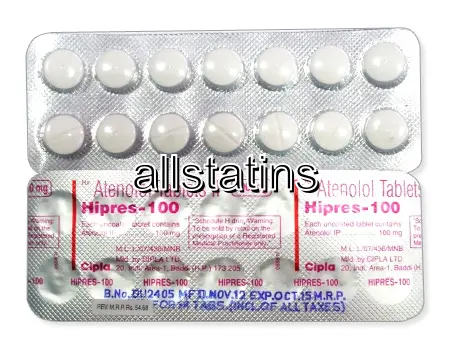| Package | Dosage | Price | Price per Dose | |
|---|---|---|---|---|
| Dosage: 25mg | ||||
| 350 pill | 25mg | NZD460.60 | NZD1.32 | |
| 140 pill | 25mg | NZD209.35 | NZD1.50 | |
| 84 pill | 25mg | NZD131.58 | NZD1.59 | |
| 56 pill | 25mg | NZD92.69 | NZD1.65 | |
| 28 pill | 25mg | NZD53.81 | NZD1.88 | |
| 14 pill | 25mg | NZD26.89 | NZD2.00 | |
| Dosage: 50mg | ||||
| 350 pill | 50mg | NZD544.35 | NZD1.56 | |
| 140 pill | 50mg | NZD230.28 | NZD1.65 | |
| 98 pill | 50mg | NZD173.45 | NZD1.79 | |
| 84 pill | 50mg | NZD164.48 | NZD1.94 | |
| 56 pill | 50mg | NZD104.66 | NZD1.88 | |
| 28 pill | 50mg | NZD62.78 | NZD2.24 | |
| 14 pill | 50mg | NZD32.87 | NZD2.39 | |
| Dosage: 100mg | ||||
| 350 pill | 100mg | NZD535.38 | NZD1.53 | |
| 140 pill | 100mg | NZD263.19 | NZD1.88 | |
| 84 pill | 100mg | NZD191.40 | NZD2.27 | |
| 56 pill | 100mg | NZD137.56 | NZD2.45 | |
| 28 pill | 100mg | NZD71.76 | NZD2.60 | |
| 14 pill | 100mg | NZD38.85 | NZD2.69 | |

Atenolol Description
Overview of Atenolol
Atenolol is a beta-blocker medication commonly prescribed to manage cardiovascular conditions. It works by blocking the effects of adrenaline on the heart and blood vessels. This action helps to lower heart rate, reduce blood pressure, and decrease the workload on the heart. Due to its effectiveness, Atenolol is frequently used to treat hypertension, angina pectoris, and certain types of arrhythmias. It is available in tablet form and typically taken once daily. Many patients find that Atenolol provides significant relief from symptoms associated with heart-related issues, improving overall quality of life.
Effectiveness and Benefits
One of the main advantages of Atenolol is its ability to effectively control high blood pressure. Proper blood pressure management can prevent serious complications such as strokes and heart attacks. Patients using Atenolol often experience a noticeable reduction in symptoms like chest pain and irregular heartbeats. Additionally, some studies suggest that Atenolol may reduce the risk of future heart attacks in certain patient populations. Its selective action on the beta-1 receptors makes it a preferred choice for many individuals, especially those with respiratory issues, as it tends to cause fewer respiratory side effects compared to non-selective beta-blockers.
Potential Side Effects and Precautions
Although Atenolol is generally well-tolerated, some users may experience side effects. Common adverse effects include fatigue, dizziness, cold extremities, and gastrointestinal discomfort. In some cases, patients might experience a slow heart rate or low blood pressure, which requires medical attention. It is important for individuals with asthma or other respiratory conditions to consult their healthcare provider before starting Atenolol, as it can exacerbate breathing difficulties. People with certain medical conditions like diabetes, peripheral vascular disease, or severe neurological issues should inform their doctor before use, since Atenolol can affect blood sugar levels and circulation.
Usage Guidelines and Considerations
When taking Atenolol, adherence to the prescribed dosage and schedule is crucial for optimal results. Patients should not stop the medication suddenly, as this can lead to a sudden rise in blood pressure or a worsening of heart symptoms. Instead, a healthcare provider should guide any dose adjustments. Regular monitoring of blood pressure and heart rate is recommended during treatment. It is also vital to inform healthcare providers about all other medications being used to avoid potential interactions. Pregnant women and breastfeeding mothers should discuss the risks and benefits with their healthcare provider, as Atenolol can have effects on the fetus or infant.
Final Thoughts
Atenolol remains a popular and effective option for managing various cardiovascular conditions. Its selective beta-1 blockade provides targeted relief with a manageable side effect profile. Patients looking to control high blood pressure or reduce angina symptoms often find good results with this medication. Proper medical guidance, consistent use, and regular check-ups are essential to maximize its benefits and minimize risks. As with any medication, individual responses may vary, and ongoing communication with healthcare professionals is key to safe and effective therapy.
